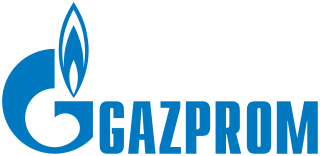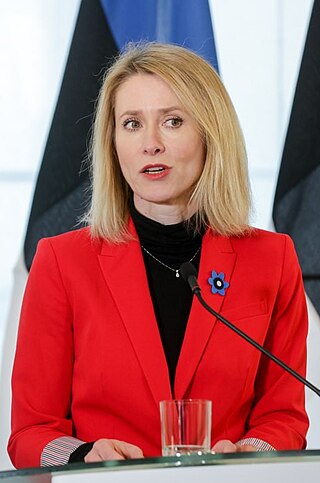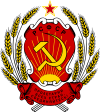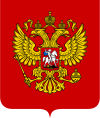
The Group of Eight (G8) was an inter-governmental political forum from 1997 until 2014. It had formed from incorporating Russia into the Group of Seven, or G7, and returned to its previous name after Russia was expelled in 2014.

The Baltic states or the Baltic countries is a geopolitical term encompassing Estonia, Latvia, and Lithuania. All three countries are members of NATO, the European Union, the Eurozone, and the OECD. The three sovereign states on the eastern coast of the Baltic Sea are sometimes referred to as the "Baltic nations", less often and in historical circumstances also as the "Baltic republics", the "Baltic lands", or simply the Baltics.

PJSC Gazprom is a Russian majority state-owned multinational energy corporation headquartered in the Lakhta Center in Saint Petersburg. As of 2019, with sales over $120 billion, it was, until 2023, ranked as the largest publicly listed natural gas company in the world and the largest company in Russia by revenue. In the 2020 Forbes Global 2000, Gazprom was ranked as the 32nd largest public company in the world. The Gazprom name is a contraction of the Russian words gazovaya promyshlennost. In January 2022, Gazprom displaced Sberbank from the first place in the list of the largest companies in Russia by market capitalization. In 2022, the company's revenue amounted to 8 trillion rubles. In 2023, the company is delisted from international markets, and continues substantial constriction in its operational results.

The Ministries of the Soviet Union were the government ministries of the Soviet Union.

The government of Russia is the federal executive body of state power of the Russian Federation. The members of the government are the prime minister, the deputy prime ministers, and the federal ministers. It has its legal basis in the Constitution of the Russian Federation and the federal constitutional law "On the Government of the Russian Federation". The Apparatus of the Government of Russia is a governmental body which administrates the activities of the government.

Bulgaria–Russia relations are the diplomatic relations between the countries of Bulgaria and Russia.

Russia supplies a significant volume of fossil fuels to other European countries. In 2021, it was the largest exporter of oil and natural gas to the European Union, (90%) and 40% of gas consumed in the EU came from Russia.
A ministry of energy or department of energy is a government department in some countries that typically oversees the production of fuel and electricity; in the United States, however, it manages nuclear weapons development and conducts energy-related research and development. The person in charge of such a department is usually known as a minister of energy or minister for energy.
Renewable energy in Russia mainly consists of hydroelectric energy. Russia is rich not only in oil, gas and coal, but also in wind, hydro, geothermal, biomass and solar energy – the resources of renewable energy. Practically all regions have at least one or two forms of renewable energy that are commercially exploitable, while some regions are rich in all forms of renewable energy resources. However, fossil fuels dominate Russia’s current energy mix, while its abundant and diverse renewable energy resources play little role.

China and Russia established diplomatic relations after the dissolution of the Soviet Union in 1991.

Yuriy Anatoliyovych Boyko is a Ukrainian politician who served as one of the Vice Prime Ministers of Ukraine between 2012 and 2014, as well as the Minister of Energy from 2006 to 2007 and again from 2010 to 2012. Other than during stint as Vice Prime Minister, he has continuously served as a Member of the Verkhovna Rada since 2007. Boyko ran for President in the March 2019 election, winning many districts in the southeast of the country but narrowly missing qualification for the second round by 4.28% of the votes.
The Gore–Chernomyrdin Commission, or U.S.–Russian Joint Commission on Economic and Technological Cooperation, was a United States and Russian Joint Commission developed to increase cooperation between the two countries in several different areas. The Commission was developed by the United States’ President Bill Clinton and Russian President Boris Yeltsin at a summit in Vancouver in April 1993. Al Gore, the United States Vice President, and Viktor Chernomyrdin, the Russian Prime Minister, were appointed as co-chairmen and the committee derives its name from those two individuals. Before his appointment to the Commission, Chernomyrdin oversaw the Soviet national oil industry as minister from 1985–1989. After the fall of the Soviet Union, Chernomyrdin organized the Soviet oil industry into the Gazprom corporation.

A ministry of trade and industry, ministry of commerce, ministry of commerce and industry or variations is a ministry that is concerned with a nation's trade, industry and commerce.

Alexander Valentinovich Novak is a Russian politician who is a current Deputy Prime Minister of Russia since November 2020.
International sanctions have been imposed against Russia and Crimea during the Russo-Ukrainian War by a large number of countries, including the United States, Canada, the European Union, and international organisations following the Russian annexation of Crimea, which began in late February 2014. Belarus has also been sanctioned for its cooperation with and assistance to Russian armed forces. The sanctions were imposed against individuals, businesses, and officials from Russia and Ukraine. Russia responded with sanctions against several countries, including a total ban on food imports from Australia, Canada, Norway, Japan, the United States, the EU and the United Kingdom.

Kaja Kallas is an Estonian politician and the current prime minister of Estonia since 2021, the first woman to serve in the role. The leader of the Reform Party since 2018, she was a member of parliament (Riigikogu) in 2011–2014, and 2019–2021. Kallas was a member of the European Parliament in 2014–2018, representing the Alliance of Liberals and Democrats for Europe. Before her election to Riigikogu, she was a lawyer specialising in European competition law.

Robert Habeck is a German Green politician and writer who has been serving as Vice Chancellor of Germany, Federal Minister for Economic Affairs and Climate Action in the cabinet of Chancellor Olaf Scholz and as a Member of the German Bundestag for Flensburg – Schleswig since 2021. From 2018 to 2022, he also served as co-leader of Alliance 90/The Greens, alongside Annalena Baerbock. For the 2021 German federal election, he was a member of the leading duo, alongside Baerbock, who ran for chancellor of Germany.
A global energy crisis began in the aftermath of the COVID-19 pandemic in 2021, with much of the globe facing shortages and increased prices in oil, gas and electricity markets. The crisis was caused by a variety of economic factors, including the rapid post-pandemic economic rebound that outpaced energy supply, and escalated into a widespread global energy crisis following the Russian invasion of Ukraine. The price of natural gas reached record highs, and as a result, so did electricity in some markets. Oil prices hit their highest level since 2008.

Vadim Valentinovich Kumin is a Russian political figure and a deputy of the 6th, 7th, and 8th State Dumas.


























